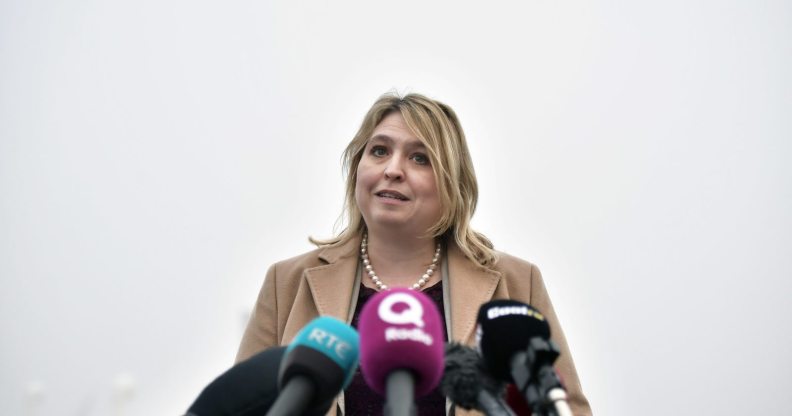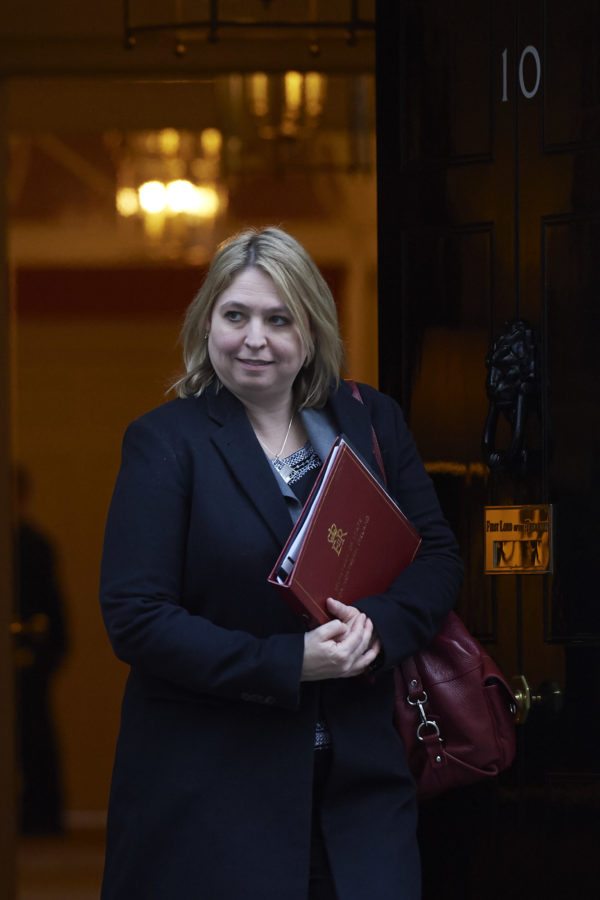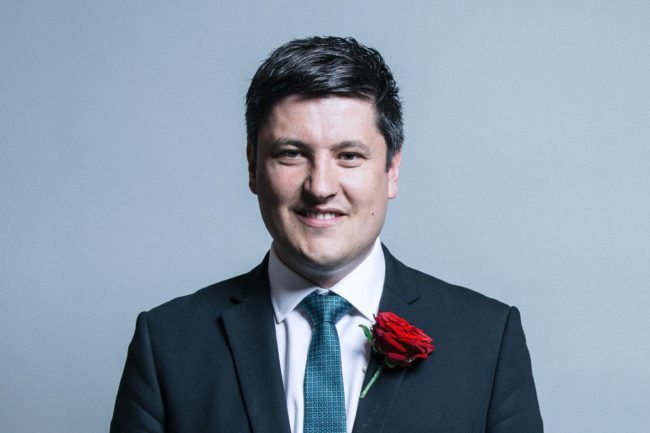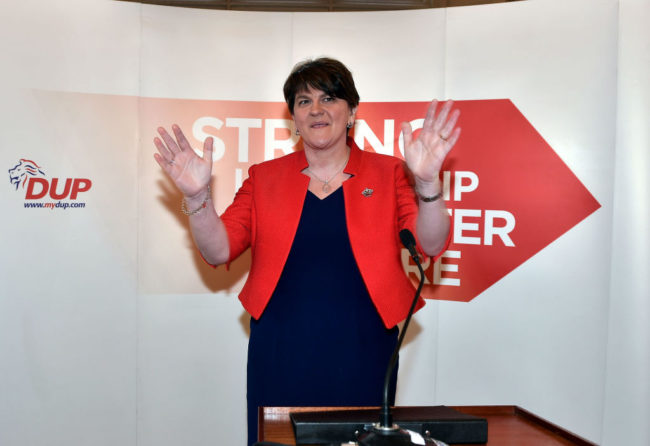Equal marriage in Northern Ireland could be settled in Westminster, UK government says

(Getty)
The Secretary of State for Northern Ireland has signalled that equal marriage could be settled in the UK Parliament – after the collapse of power-sharing talks.
Northern Ireland is the only part of the UK without equal marriage, due to opposition from the hardline Democratic Unionist Party.
The issue has been blocked by the DUP in the Northern Ireland Assembly for years – but following the collapse of power-sharing in the region, LGBT activists have called on UK Prime Minister Theresa May to intervene.
In a major concession this week, the Northern Ireland Secretary has conceded for the first time that the issue could indeed end up being settled under direct rule in the UK Parliament.
Explainer: Why doesn’t Northern Ireland have equal marriage yet?
The Secretary of State for Northern Ireland, Karen Bradley, emphasised her belief that it would be best settled in the devolved assembly, but signalled the government would not whip its MPs to oppose a backbench bill on the issue.
Labour’s Conor McGinn had asked the Secretary of State for Northern Ireland “what her policy is on equal marriage for same-sex couples in Northern Ireland; and if she will bring forward legislative proposals on that policy”.

Karen Bradley MP(Getty)
In response, the Secretary of State said: “In accordance with the Belfast Agreement, this is a devolved matter which should be addressed in the NI Assembly; but the power of the Westminster Parliament to legislate remains unaffected.
“If this issue were to be raised in Westminster, the Government’s policy is to allow a free vote on matters of conscience such as equal marriage.”
The confirmation that the Government would not oppose the measure may lead to plans for a backbench bill on the issue.
Labour’s Lord Alli said: “Whilst we all want to see a return of power sharing government and a vote for equal marriage in the Assembly, the Secretary of State is right to recognise the fact that the current discriminatory situation in Northern Ireland is unsustainable.
“I welcome the Goverment’s commitment to allowing a vote on equal marriage in Westminster and would ask that the Secretary of State now set a clear deadline for legislation in either the restored Assembly or UK parliament because lesbians and gays in Northern Ireland have already been waiting for equality for far too long.”
Patrick Corrigan of the Love Equality campaign for civil marriage equality said: “The outcome of the political talks has been deeply disappointing.
“Even if the parties had reached a deal on the basis of the widely reported draft, marriage equality legislation at Stormont would have been doomed to failure, given the lack of agreement on reforming the Petition of Concern. We have no confidence in the prospects of the proposed review of the Petition of Concern, given the failure of the parties to agree any reform as part of the talks themselves.
“Sadly, equal marriage appears not to have been a sufficient political priority in these talks. On the basis of the leaked deal, Northern Ireland’s LGBT community was looking at the prospect of four more years of second-class citizenship.
“That is not good enough and we demand change.
“We are calling on the UK Government to introduce legislation at the earliest opportunity to bring Northern Ireland’s laws on marriage equality into line with the rest of the UK.
“We welcome the positive tone of the Secretary of State’s answer today, that the government would allow a free vote on the issue, but it falls short of what is now required.
“In every other jurisdiction in the UK and Ireland, it has been government legislation which has ensured equality for same-sex couples. The rights of LGBT people in Northern Ireland to be treated equally should not be left to the lottery of the Private Member’s Bill process.
“The Government can fix this problem and be assured of overwhelming support across both Houses of Parliament. It should do so without further delay.”
There have been several proposed compromises to allow progress on the issue.
Labour MP Ged Killen recently suggested an amendment to the Marriage (Same Sex Couples) Act, which regulates same-sex marriage in England and Wales, to require recognition of those marriages in Northern Ireland without directly legislating for equality.

Ged Killen MP
Mr Killen wrote: “I would like to welcome you to your new position and wish you well as you begin the important task of trying to resolve the political deadlock in Stormont and see the return of a functioning Northern Ireland Executive.
“Shortly before your appointment I raised the issue of the recognition of same sex marriages in Northern Ireland with your predecessor at Northern Ireland questions.
“In my question, I asked the Government whether it would consider amending the Marriage (Same Sex Couples) Act 2013 to allow same sex marriages conducted in the rest of the UK to be recognised in Northern Ireland.
“Same sex marriages are a hard fought and hard won right for the LGBT community in the UK. However, under the current legislation this right is not recognised in Northern Ireland.
“Should a same sex couple married in the rest of the UK settle in Northern Ireland their right to say that they are a married couple will not be respected in the public records as any partnership between a same sex couple will only be recorded as a civil partnership by the Northern Ireland registrar.”

DUP leader Arlene Foster (Photo by Charles McQuillan/Getty Images)
He added: “The Government has set out its view on several occasions that it will not make powers available for same sex marriages to be performed in Northern Ireland as it believes this is a matter for the Northern Ireland Assembly.
“However, the Government could act to ensure that UK citizens do not have their rights to a recognised marriage removed simply because they choose to settle in another part of the country. Various court cases have been undertaken to provide for the recognition of UK same sex marriages in Northern Ireland, however these legal challenges have been dismissed in judgements which have cited the need for legislation.
“The Government has previously stated that it will continue to advocate for the rights of LGBT people in Northern Ireland despite its confidence and supply agreement with the DUP. I am hoping that as the incoming Secretary of State you will demonstrate this and ensure that there is no regulatory divergence between Northern Ireland the UK when it comes to recognising marriage.”
And Labour’s Shadow Secretary of State for Northern Ireland, Owen Smith, was last year rumoured to be considering backing proposals for a referendum on the issue, which could allow the issue to be legislated in Westminster but voted on by the people of Northern Ireland.
If the issue is not solved in Westminster, it is unlikely to see a resolution for several years.
Power-sharing talks between the DUP and Sinn Fein, aimed at restoring the region’s devolved executive and assembly, collapsed earlier this month after little progress was made.
Sinn Fein cited equal marriage as one of the key bones of contention in the talks, alongside cultural issues like demands for an Irish Language Act.
Meanwhile, a number of DUP hardliners have threatened to walk away from any deal that includes same-sex marriage.
A DUP spokesperson told the Belfast News Letter last week: “The DUP has a mandated policy to defend the current definition of marriage. We stand by that commitment.”
A source inside the party also told the outlet that the party would continue to employ a ‘petition of concern’ to block equal marriage in any resumed Assembly.
A group of Northern Irish teens delivered a petition to Assembly Members last week.

